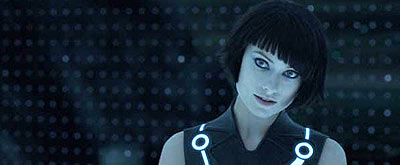The Dad Abides: Tron: Legacy
Published on January 30th, 2011 in: All You Need Is Now, Current Faves, Issues, Movie Reviews, Movies, Science and Technology, Science Fiction |By Lisa Anderson
There have been a lot of father-son issues in movies lately.

Tony Stark deals with his father’s legacy in Iron Man 2. Robert Fischer’s feelings toward his recently departed father make possible the titular mind-crime in Inception. In The Town, Ben Affleck’s character has a troubled relationship with his jailed dad. Even the critically panned Wall Street 2: Money Never Sleeps is about the daughter of Gordon Gekko. (Okay, it was actually about her boyfriend, but still.) It’s easy to wonder if it’s just coincidence—after all, fraught relationships are an easy way to raise the emotional stakes in a story—or if there’s something going on the in popular subconscious. No recent movie has put father-son dynamics as close to the forefront, though, as Tron: Legacy.
In 1982’s Tron, Kevin Flynn, a free-spirited hacker and genius videogame designer, is transported into the computer system of ENCOM, the company he once worked for. There, he finds a world of self-aware computer programs (which all look suspiciously like their designers) being pitted against each other in gladiator-style games. By the end of the movie, he has helped overthrow the despotic Master Computer Program and returned to the non-digital world.
In Tron: Legacy, Flynn has gone on to marry and have a son, Sam, only to throw himself into his work after Sam’s mother dies. Then one night, Flynn disappears. We see Sam years later, as a competent but troubled young man with a controlling interest in ENCOM. Flynn’s friend, Alan Bradley, receives a mysterious page that Sam follows to his father’s old arcade. There, Sam is transported to the same digital frontier that his father discovered. He finds his father there . . . but the games of the first film still go on, this time presided over by Clu, a tyrannical Program made in Flynn’s own image.
Much has been made over how superior the special effects in Tron: Legacy are to the original. The truth is that the effects in Tron were groundbreaking for the time when they were made, but the improvements since then are, of course, exponential. Even without the overrated enhancement of 3D, this is a visually beautiful movie. A lot is done is done with color—orange and white and blue and red—and with the contrast of light against dark. The transparent surfaces in the games are much more well-defined than they were before, and the lightcycle course is filled with new hills and valleys and bypasses.

One of the most remarkable effects, however, is the digital rejuvenation used for the young Flynn and the ageless Clu. There are brief instants where this effect falls into the uncanny valley, or the face doesn’t seem expressive enough; but considering the sheer amount of screen time given to a digital version of Jeff Bridges, it’s done amazingly well.
I couldn’t help but see the connections with another science fiction franchise: The Matrix. In Tron, the loyal Programs speak of their Users with almost religious terminology. Once on the Grid, Flynn—much like the Matrix trilogy’s Neo—quickly learns that he is capable of things that the people around him were not. I don’t know if the Wachowskis have ever cited Tron as an influence, but they both examine the idea of being inside a computer system. I am convinced, however, that the Matrix movies influenced Tron: Legacy. When Sam goes to the End of the Line club in search of an influential Program named Zuse, I am strongly reminded of the scene where Trinity, Morpheus, and Seraph invade a dance club to confront the Merovingian.
While the Matrix series had computer programs that could reproduce together, the second Tron movie gives us programs that arise spontaneously. The Isomorphic Algorithms, or ISOs, were a discovery that Flynn made before disappearing, He believed that they would change much of what the world believed about science, religion, and technology. By the time Sam arrives, however, Clu has exterminated all the ISOs but one—Quorra, an endearing if somewhat one-dimensional blend of Manic Pixie Dream Girl and Action Girl. In many ways, she gets the father that Sam never had, as Flynn takes her in and teaches her about his world.
We learn that Clu exterminated the ISOs and became the dictator he is because he misinterpreted Flynn’s injunction to “build the perfect system.” In this way, Clu is Flynn’s Shadow, in Jungian terms—the subconscious collection of our flaws and instincts, which becomes more powerful and destructive the harder we try to avoid it. There are other indications that this is what Clu is meant to represent. He wears black while Flynn wears white. Clu even echo’s Flynn’s words when speaking to an army he has assembled.
Based on what we know of him from the first Tron, it’s unlikely that perfectionism is Flynn’s big weakness. The older, wiser, Flynn however (who we first see in meditation), confesses to his son that he was unable to recognize perfection when it was right in front of him. In other words, things were perfect just as they were—especially his life with Sam. In the end, Flynn reintegrates his Shadow by apologizing to it for what he had not known when it was formed. This remarkable turn of events adds depth to what could have been a popcorn movie.
Don’t get me wrong: Tron: Legacy is not on the same level with the Matrix trilogy in terms of the script. There’s more character development than there was in Tron (which is to say, there actually is some), but not much. Flynn has done most of his changing before Sam reunites with him, and Sam does most of his in the movie’s last few minutes. In the end, though, this is Kevin Flynn’s story, in the same way that the title of Return of the Jedi was referring to Anakin Skywalker. The visuals may be Tron: Legacy‘s selling point, but its hero coming to terms with his son and his personal demons make it more than just eye candy.

Time limit is exhausted. Please reload the CAPTCHA.